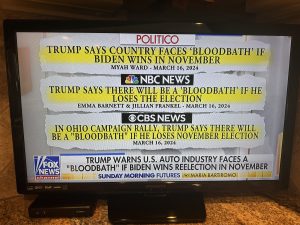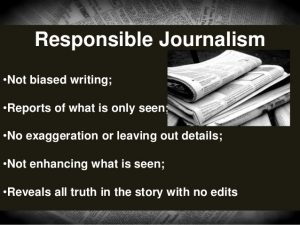I have often equated the journalism produced by today’s mainstream media to propaganda. Like the old Soviet Union’s Pravda newspaper and China’s Xinhua news agency, a majority of our news organizations have morphed into little more than state-sponsored media.
As was the case with Pravda and Xinhua, our news media support the ruling party. In the PRC and the defunct USSR, it was the communist party. In the U.S. today, it is the Democrat Party.
Some readers may ask what evidence there is that America’s mainstream media has embraced propaganda rather than truthful, unbiased reporting.
The most recent example occurred this past weekend when, in a speech in Dayton, Ohio, Donald Trump warned of a “bloodbath” in the auto industry if he is not elected in November because if Joe Biden wins, Democrats will mandate a switch to electric vehicles.
Specifically, Trump focused on China building factories in Mexico to produce EVs for the American market. He promised to slap 100 percent tariffs on those cars if he is elected and added:
“Now, if I don’t get elected, it’s going to be a bloodbath for the whole (auto industry), and that’s going to be the least of it. It’s going to be an (economic) bloodbath for the country.”
Trump added that if he’s elected, “they’re not going to sell those cars” (in America).
It took only a few minutes for the mainstream media to turn those statements into anti-Trump propaganda.
Take a look at these headlines, and you can see for yourself just how they did it. The headline at the bottom, posted on Fox’s Sunday Morning Futures show, is the only one that accurately presents what Trump actually said:

As a former journalist and, later, a professor of journalism at the University of Illinois, I am ashamed of the unfair and partial journalism I see being committed today. News—especially news emanating from the networks and cable TV (and I use the word “news” advisedly)—is slathered with a thick coat of disinformation, indoctrination, and misinformation. In other words, propaganda.
The reporting I see, hear, and read today is often filled with the reporter’s biases and political opinions. If I had written the partisan and dishonest stories I see all too often today, I would have been run out of the Chicago Tribune newsroom, where I started my career in the early 1970s.
Not long ago, I wrote a commentary on the state of America’s moribund news media. It appeared in my blog and several other outlets. Here it is again for those of you who might have missed it. I hope it answers some of your questions about America’s deteriorating and partisan news media. Please read on.
Some Thoughts about Today’s News Media
Good journalism, somebody once said, is a nation talking to itself.
That’s “talking to itself,” not yelling, screaming, shrieking, talking over one another, and engaging in verbal bullying.
That is just about all we see on prime-time television, especially cable television.
Primetime cable TV outlets such as Fox, CNN, MSNBC, CNBC, etc., continue to produce a proliferation of hosts and pundits with no foundation in journalistic ethics and tradition. Today’s so-called “news shows” more often than not degenerate into shout fests where guests and hosts engage, not in intelligent discussion of issues, but in contests to see who can talk the loudest or bully those who disagree with them into submission.
That kind of “squawk talk” comes with a steep price. What does the viewing public learn from such exhibitions of bad behavior?
The answer, I would argue, is not much. When people yell at one another, call one another names, or behave like petulant children, reasoned discourse disappears, and the viewer gets lost in the shrill verbal brawl of the moment. I believe we have lost the art of reasonable discourse in this country. If you disagree with someone, talk or shout over them, call them names, make faces, and behave like a two-year-old. (Sorry if I have insulted any two-year-olds).
Opinion is NOT reporting. Yet those media experts who monitor the recent explosion of misnamed “news shows” say viewers don’t discern between shows with distinct political agendas and those that attempt to present events with a minimum of subjectivity and a maximum of fairness and balance.
When I started in the newspaper business, reporters were taught that while all of us have biases, as professionals, we must work to subordinate those prejudices and keep our opinions out of the stories we report.

It was drilled into our heads, and editors ensured it never left.
That is just not the case today. Too many journalists (or those who like to call themselves journalists) feel compelled to insert their opinions in everything they write or produce. The “new” journalism of assertion and vilification has displaced the old journalism of verification. Gossip has become news, fiction is now fact, and biases are a part of straight news reporting.
Many of these “journalists” are not journalists at all but merely former political operatives and talking heads who pretend to be journalists when real journalists are risking their lives in places like Afghanistan, Syria, and Iraq to bring people reliable news.
The opinion-fueled shows that dominate cable news channels during prime time are far removed from the old-school straight news programs such as the traditional nightly network newscasts with which many of us grew up.
At an awards dinner several years ago in New York for the late Mike Wallace of CBS 60-Minutes fame, I talked with Walter Cronkite about the state of television news in general and prime-time cable news in particular.
During his reign on CBS, Cronkite, who died in 2009, was often referred to as the most trusted journalist in America–an appellation he didn’t take lightly. He was commonly referred to as “Uncle Walter.” I do not doubt that Cronkite leaned left of the political spectrum, but I also know that he was careful not to let his political beliefs infest his newscasts. When he did, he removed his reporter’s hat and acknowledged that he was about to offer his opinion about an issue or topic.

During our conversation at that dinner, he decried the lack of ethics and professionalism that is so pervasive in newsrooms today.
“Too many of these people simply don’t care about or have any desire to ferret out the truth,” Cronkite told me. “Too many have intense political or social agendas, and rather than present information as objectively as possible, they want to jam their opinions down our throats.”
And, he added, most of the public cannot distinguish between these faux journalists and real reporters.
The Society of Professional Journalists—an organization I have belonged to since my days as a student at the University of Kansas—has a code of ethics that most cable TV’s shouting heads have no concept of.
As with most of the journalists I have worked with in the U.S. and around the world, I have always labored assiduously to follow that code, which consists of several sections.
The ones that stand out most in these days of ersatz journalism (and which are, unfortunately, too often ignored) are:
- Give voice to the voiceless; official and unofficial sources of information can be equally valid.
- Distinguish between advocacy and news reporting. Analysis and commentary should be labeled and not misrepresent facts or context.
- Test the accuracy of information from all sources and exercise care to avoid inadvertent errors. Deliberate distortion is never permissible.
- Journalists should be free of obligation to any interest other than the public’s right to know.
- Support the open exchange of views, even views they find repugnant.
- Journalists are accountable to their readers, listeners, viewers, and each other.
I have purposely not mentioned the names of the most egregious offenders here because doing so would require several more pages of copy. But I urge you to watch these so-called “news shows” with a critical eye and ear from now on.

Pay attention to who they have on as guests or experts and how often they appear. Watch how those with opposing views are interviewed–or not interviewed. Are they allowed to get their points or arguments across without being shouted down?
What kinds of discussions are held on issues? Are they truth-seeking or attempts merely to reinforce the host’s opinion or a political narrative?
Does each member of a panel have an opportunity to talk without being insulted by the host or by some other panel member?
How you answer these questions will help you determine if you are watching a frenzied opinion fest or a real news show designed to get at the truth.
Thomas Jefferson once said: “An informed citizenry is the only true repository of the public will.”
So, I will end where I began.
Good journalism is a nation talking to itself—and, I would add, it is a nation that learns from intelligent, rational discourse and has at its core the responsibility to help advance and encourage an informed citizenry.
–30—
If you enjoyed this post, please consider subscribing to ForeignCorrespondent and tell your friends to subscribe. IT’S FREE! WHAT A DEAL! If you’ve received this from a friend and would like to be added to our distribution list for future blog posts, please enter your email address in the sign-up for notifications box at https://ronaldyatesbooks.com/category/foreign-correspondent.
You can also find my commentaries on Substack at https://ronyates.substack.com/ and the American Free News Network at https://afnn.us.
Please feel free to comment. WE LOVE COMMENTS!

